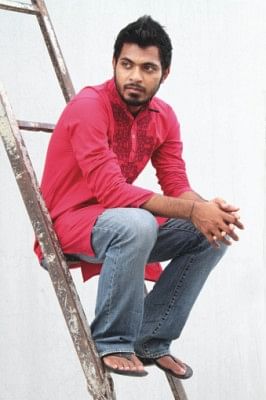Landmarks in music

Photo: Mumit M.
With the march of youth in all arenas, talented singer Arfin Rumey has seized the spotlight in the music scene. The Daily Star recently had a one-to-one with the popular musician:
Since when have you been involved in music?
Arfin Rumey: Growing up, I used to listen to Baul and Murshidi songs at ashor (musical soiree) held at my paternal grandfather's house. My mother used to play the harmonium and sing along. Music captivated me from an early age. I won't say that I practiced singing a lot, but I took lessons from several Ustads. However, I listened to a range of music, including English, Hindi and Urdu. The old parts of Dhaka have an environment where the practice of Urdu flourished, opening a door to other genres. I also observed my mother take lessons from an Ustad. When I was alone at home I tried to pick up the songs on the harmonium.
Which song launched your career as a music director?
Arfin Rumey: “Shopnodana”, a 2007 song by the band Durbin, launched my career. The band came in the spotlight through this song. Shahid bhai sang the song (Fuad bhai's composition and Shahan Kabandha's lyrics). As a music director, “Shopnodana” was the first song I worked on. Fuad bhai then introduced me to this career. I also met Habib Wahid through his father Ferdous Wahid. My first jingle -- tuned by Habib bhai -- was in 2006 for Pran Mango Juice. Before that, I had never stepped into a studio. It was Habib bhai who inspired me to compose my own tunes. Later, I saved up money to buy a keyboard and a computer and began working. Everyday I sat for eight-nine hours to work on compositions. I gave Fuad bhai a couple of songs and asked for his opinion. He always showed a professional attitude towards me and paid me for my work. Apart from “Shopnodana”, most of the songs in “Chapter-2” -- Mila's breakthrough hit album -- were done by me.
It is often said that the new generation of singers chase fame rather than hone their skills. Is it true?
Arfin Rumey: The change of generations and transition of trends give rise to many opinions. One should understand how much dedication and labour goes into making music. I stay in my studio 16 hours a day and practice singing whenever I need to. There is no set rule that such practices need the company of harmonium or tanpura. Western culture relies more on chords than Do-Re-Mi-Fa; aren't they producing good music? It all depends on what the artistes need to survive in a competitive market.
Many complain that you emulate others' music. What do you have to say about this?
Arfin Rumey: There are no other musical notes but Sa-Re-Ga-Ma-Pa-Dha-Ni-Sa. I was inspired by the works of Habib bhai and Fuad bhai and they have a deep influence on me -- even though it is unintentional. A.R. Rahman is my idol -- not only as a musician, but I also like his approach to life. In the case of music, God is my true idol, because it was his creation of the universe that sparked the first tunes.
Which of your own songs is your favourite?
Arfin Rumey: I haven't been able to produce my favourite work yet. As a listener, I have a certain standard, and I've failed to create anything of that magnitude.
What are the songs most loved by the audience?
Arfin Rumey: “Er Beshi Bhalobasha Jaye Na”, “Tomari Poroshe”, “Chithhi”, “Priyotoma” and “Shona Bou”.
Any future plan?
Arfin Rumey: If I can I would like to stop featuring others in my albums. When an artiste I feature in my album forgets to give me my deserved credit, it hurts. I will also stop singing tunes set by others. My last studio performance was in Prince Mahmud's album “Nirbachita”. I'll reconsider it if I find the ambiance favourable.
What was it like working with the Indian artiste Shubhomita?
Arfin Rumey: When we worked, I took on the challenge in a relaxed manner and was thus able to work successfully with an artiste of her calibre. I even asked her for several takes. She admired me greatly for my tunes and compositions. She is a very professional singer and there is much to learn from her.
How many songs did you compose for her?
Arfin Rumey: Three. One for the movie “Dhanmondi Aat Number”, another song “Protidin Dekhi” for the album “Bhalobashi Tomaye”, and “Ek Jibon” for Shahid bhai's album “Nilambori”.

 For all latest news, follow The Daily Star's Google News channel.
For all latest news, follow The Daily Star's Google News channel. 



Comments